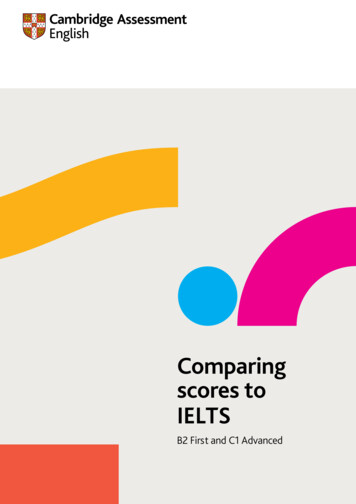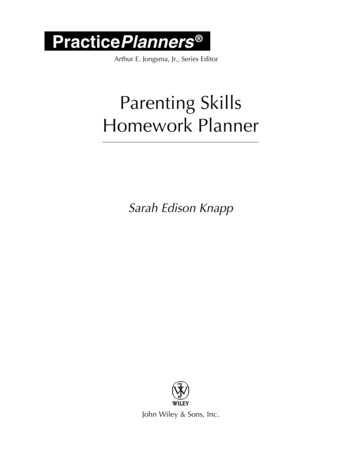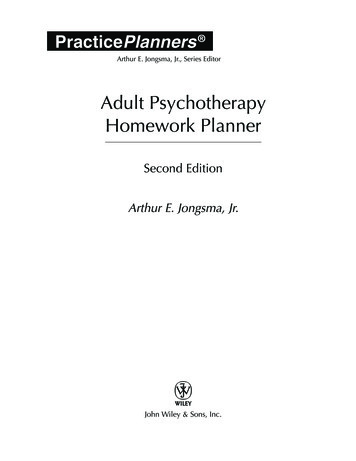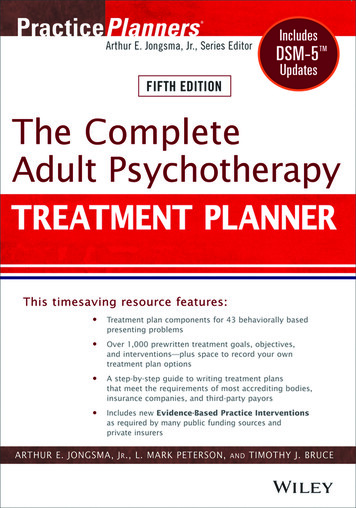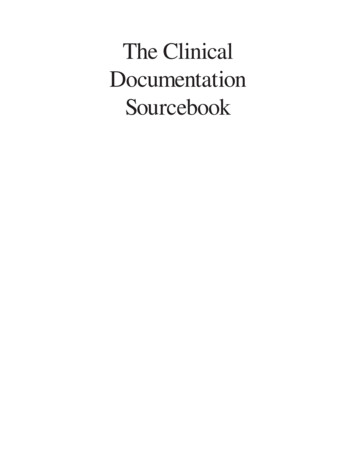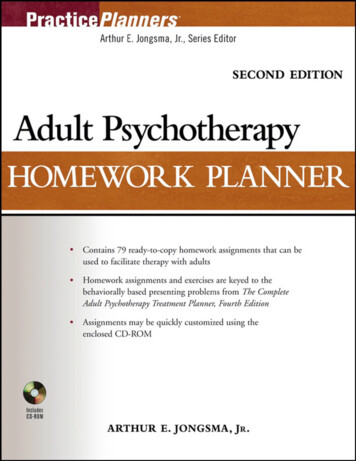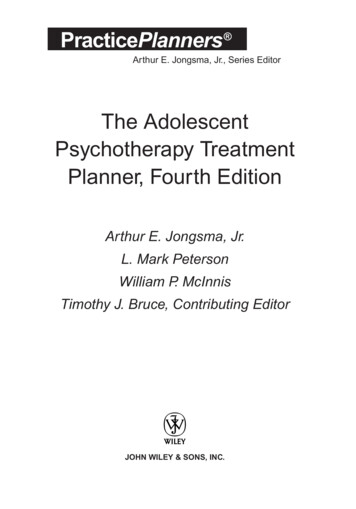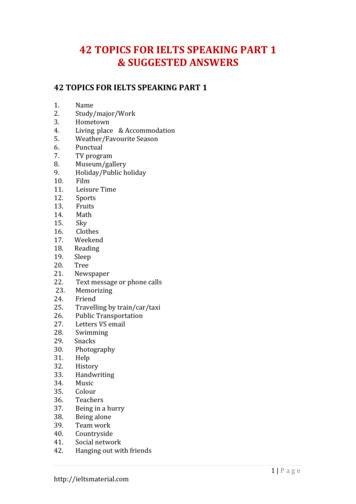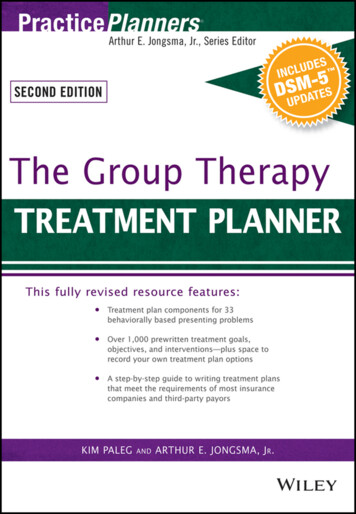
Transcription
IELTS StudyPlanner
IELTS Study Planner is brought to you by the British Council, the world's English teaching experts. It is arecommended study plan that we hope you follow in the next month to make sure you are ready to take IELTS.Our plan will guide you to a range of free IELTS study materials and resources, as well as suggest activities youcan do to improve your English skills. It is our hope that the planner will get you acquainted with the test formatand also improve your confidence when writing, speaking, reading and listening in English.Please note, the IELTS Study Planner is intended to be used as a guideline only. Use the self-check boxes to tickwhether or not you have completed the activities listed. Many of you will have different needs and priorities,based on factors such as general English language ability and time available to study. Feel free to adapt theplanner to best suit your needs, for example, by spending more time focusing on the skills that you are weaker in,or practicing a different skill each day.And remember, for most of you, your IELTS preparation began a long time ago when you first started to learnEnglish! We hope you enjoy using the Study Planner.DayActivityTest takers who understand the format of IELTS are at an advantage.Become familiar with IELTS by looking ut ielts/what is st-formatTake a practice IELTS test to better understand your current Englishlevel. You can find practice papers at:1https://www.chinaielts.org/guide/sample stsYou can now take the IELTS test on a computer! Go to ChinaIELTS formore information. Take the familiarization test at GELIELTS.Download the IELTS Prep App onto your phone to give you instantaccess to free practice tests and sample questions for the listening,reading, writing and speaking sections.To give you an approximate indication of your English level, go toLearnEnglish and take our free online English test.Consider purchasing additional IELTS practice materials. For moreinformation, please go to:ChinaIELTS (for text books and past papers)Road to IELTS (for a comprehensive online preparation program)Self-check
Week 1Day2Activity (Focus: Listening)Go to IELTS.org and learn everything you can about the listening section(format, timing, task types, how it’s marked).Go to IELTS.org and look at some of the listening sample questions.Go to Dialang and find out your English proficiency level in listening.What are the key listening skills being tested in IELTS? Go to VoicesMagazine and read ‘Five essential listening skills for English learners’.3Download the LearnEnglish Audio and Video app and practice listeningto different podcasts & videos on a wide range of topics.Watch an English-language movie/TV show from an English-speakingcountry that isn’t the U.K. or U.S.A. Can you full understand the accent?What should you do before you hear the test recording? Have a read ofsome helpful advice in the ‘Exams’ section of LearnEnglishTeens.4Watch an English language movie/TV show with subtitles in English.Remove the subtitles once you start feeling confident.Try to do some listening where there are no visual clues (e.g. ChinaPlusRadio), as this mirrors the listening in the IELTS test.5What should you do during the test recording? Have a read of somehelpful advice in the ‘Exams’ section of LearnEnglishTeens.Watch/listen to a sports match (that you are familiar with) with Englishcommentary.Listen to some English songs and try to write down the lyrics that youhear. Use the internet to see if you were correct.6What should you do after you hear the test recording? Have a read ofsome helpful advice in the ‘Exams’ section of LearnEnglishTeens.Watch a TED talk online, and choose a topic that may appear in IELTS,i.e. environment, education, health, etc. Try and identify how stress,intonation, pauses, and repetition are used for emphasis in the talk.Go to the ‘Skills’ section of LearnEnglishTeens, and attempt some of thefree listening activities at your level.7Go online (e.g. download the British Museum Guide app) and listen to avirtual tour of a famous museum or landmark in English.Watch another TED talk online. When you are listening to the talk, pausethe recording and try to predict what will come next.Go to IELTS.org and test yourself with some of the listening samples!8Compare your responses to the correct answers. Where did you earnmost marks? Where did you have misunderstandings?Listen again to the listening samples. Can you hear the correct answer now?SelfSelf-checkcheck
Week 2Day9Activity (Focus: Writing)Go to IELTS.org and learn everything you can about the writing section(format, timing, task types).Go to IELTS.org and look at some of the writing sample questions.Go to Dialang and find out your English proficiency level in writing.Go to ChinaIELTS and download the writing assessment criteria. Payattention to the descriptors ONE LEVEL above your current level.10If you are not sure what each of the four assessment criteria means,watch the short videos at ChinaIELTS in the ‘band descriptors’ section.Read a news story online (e.g. the Mirror), and make use of the commentssection where you can write your opinions about the story.What are some things you should do before you start writing in a test?Read about planning time in the ‘Exams’ section of LearnEnglishTeens.11Download the IELTS Word Ready app to help with your vocabularylearning for academic writing.Start writing a blog. You can write about your interests, ideas, wishes,humour and anything else you think about in English!12What do you need to consider when you’re writing in a test? Read aboutwriting time in the ‘Exams’ section of LearnEnglishTeens.Download the LearnEnglish Grammar app to help with yourgrammatical ability for academic writing.Find a Website containing statistical data (e.g. Statista), choose a table,graph or pie chart and write a short description of it.What should you do after you’ve finished writing in a test? Read aboutreviewing time in the ‘Exams’ section of LearnEnglishTeens.13Choose an article in a newspaper and write a persuasive essay aboutthe topic, using some ideas and content from the original article.Look back at your old written work. Circle any words/grammaticalstructures that are simple/repetitive, and replace with stronger ones.Go to the ‘Skills’ section of LearnEnglishTeens and attempt some of thewriting activities at your level.14Practice free writing: write about any topic for 5 mins. Do not stop toread what you are writing, and you’ll notice that your writing will becomemore fluent over time.Send phone messages in English to friends who are learning English.Go to IELTS.org and test yourself with some of the writing samples!15Self-assessment: Look at the band descriptors and check if you haveincluded everything you need to at your desired level.Peer-assessment: Ask a friend to evaluate your task answers, using theband descriptors OR a specific language area you’d like to focus on.Self-check
Week 3Day16Activity (Focus: Speaking)Go to IELTS.org and learn everything you can about the speaking section(format, timing, task types).Go to IELTS.org and look at some of the speaking sample questions.Go to FutureLearn and sign up to ‘Understanding IELTS: Speaking course’(open Mar 16th).Go to ChinaIELTS and download the speaking assessment criteria. Payattention to the descriptors ONE LEVEL above your current level.17If you are not sure what each of the four assessment criteria means,watch the short videos at ChinaIELTS in the ‘band descriptors’ section.Download the new IELTS Smart Learning app, practice speaking Tasks 1& 2, and receive feedback on your speaking!What communication strategies can you use in the test? Have a look atsome in the ‘Exams’ section of LearnEnglishTeens.18Download the IELTS Word Power app to help with your vocabulary whenspeaking.Start an audio journal: practice speaking on a certain topic for 2 minseach day and record it with your phone. Listen and evaluate yourself.19How can you become more accurate and fluent when speaking English?Read some advice in the ‘Exams’ section of LearnEnglishTeens.With a friend who is also learning English, choose a topic that interestsyou and send each other voice messages in English about it.Find an international language partner on an establishedlanguage-exchange Website like italki to help you practice English.Need some tips on how to answer common tasks in a typical speakingtest? Go to ‘Exams’ section of LearnEnglishTeens and find out.20Create your own vlog (on a topic that interests you) and share with yourfriends; encourage them to give feedback on your language.Watch a recent movie and note down any idiomatic language that youhear; try and include this language in your everyday spoken English.Go to the ‘Skills’ section of LearnEnglishTeens and attempt some of thefree speaking activities at your level.21If you cannot find an (online) conversation club/English corner to join inyour university/city, create one yourself today!Choose a scene from a movie you like and try to copy the actor’sspeech. Pay close attention to their pronunciation and try to copy it.Go to IELTS.org and record your answers to some speaking samples!22Self-assessment: Look at the band descriptors and check if your recordedanswers include everything you need to at your target level.Peer-assessment: Ask a friend to evaluate your task answers, using theband descriptors OR a specific language area you’d like to focus on.Self-check
Week 4Day23Activity (Focus: Reading)Go to IELTS.org and learn everything you can about the reading section(format, timing, task types, how it’s marked).Go to IELTS.org and look at some of the reading sample questions.Go to FutureLearn and sign up to ‘Understanding IELTS: Reading course’(open Mar 16th).Do you have problems with your reading speed? Go to Voices Magazineand read ‘How to help English learners read more quickly’.24Go to Dialang and find out your English proficiency level in reading.Read graded readers (texts which are graded to your level) Visit yourlocal bookstore to find English stories at different reading levels.What should you do before you start reading in a test? Have a look atsome helpful advice in the ‘Exams’ section of LearnEnglishTeens.25Change your social media, computer settings, phone settings, emailsettings to English.Cook a meal with an English language recipe. You can find some recipesat GoodFood.26What should you do while you are reading in a test? Have a look at somehelpful advice in the ‘Exams’ section of LearnEnglishTeens.Go online and find an English language magazine, blog, or newspaperthat interests you (but you have never read before) and start reading it.Read an article from a newspaper (e.g. ChinaDaily), and try to write ashort summary of it by identifying the key points. .Need some tips on how to answer common task types in a reading test?Go to ‘Exams’ section of LearnEnglishTeens and find out.27When reading a text, start choosing words/phrases that you think areimportant and which you want to learn, and store them in a notebook.Choose one article from a newspaper, and note down the words andexpressions that are used to link the paragraphs/or ideas in the articleGo to the ‘Skills’ section of LearnEnglishTeens and attempt some of thefree reading activities at your level.28Start reading a book in English which you have already read in yournative language or has been made into a film which you have seen.Set up a reading club with friends. One member chooses something foreveryone to read and it’s discussed in the next meeting.Go to IELTS.org and test yourself with some of the reading samples!29Compare your responses to the correct answers. Where did you earnmost marks? Where did you have misunderstandings?Read the sample text again. Can you find all the correct answers now?Self-check
Week 5DayActivitySelf-checkTake a practice IELTS test under timed conditions.30Compare your responses to the correct answers. Where did you earn mostmarks? Where did you have misunderstandings? For speaking & writing, aska teacher from your school to evaluate your responses based on the banddescriptors.Look back at your answers/responses. What would you do differently if youtook the test again? Write a short summary.31For some last minute test advice, go to CambridgeEnglish, download theIELTS FAQs, and read them carefully.Go to ChinaIELTS and watch some of the ‘Killing IELTS Rumours’ videos.Review some of the more useful resources in this study planner.Put the study books down, have a nice meal and get a good night’s rest.Good luck on your test!Websites:IELTS registration website:IELTS Smart Learning wnload-app/homeIELTS official websites:British Council English learning il.org/voices-magazineIELTS familarization test at GELIELTS:Other English learning www.chinadaily.com.cnFutureLearn courses:“Understanding IELTS: erstanding-ielts-speaking?utm source BC CHINA website&utm medium web&utm campaign IELTS Speaking2 Mar20“Understanding IELTS: rstanding-ielts-reading?utm source BC CHINA website&utm medium web&utm campaign IELTS Reading2 Mar20Developed by British Council East Asia Assessment Solutions Team. Copyright March 2020 by British Council. All rights reserved
IELTS Study Planner is brought to you by the British Council, the world's English teaching experts. It is a recommended study plan that we hope you follow in the next month to make sure you are ready to take IELTS. Our plan will guide you to a range of free IELTS study m

